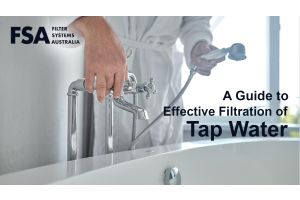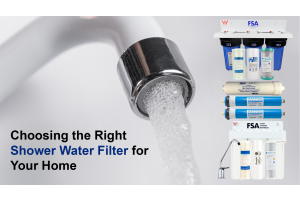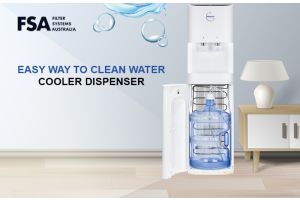
A water softener is an appliance or filtering device designed to remove calcium and magnesium from water. Most people don't realize that all water isn't the same, specifically in terms of chemical composition. Certain types of water contain high levels of calcium and magnesium due to absorption from the earth, which makes it extremely hard water. Water is considered soft when it cannot absorb these minerals or contains them in small quantities. The water that comes from lakes and streams is typically naturally soft.
However, underground water in areas with high levels of gypsum, chalk, and limestone is generally hard. So, to ensure that water for domestic use is soft, a water softener is employed to eliminate the minerals that make it hard. Thus, softening water removes magnesium and calcium, and other metal cations from the water.
What is Hard Water?
Hard water has a significant amount of minerals such as magnesium, calcium, and, occasionally, manganese and other Cations. Hard water is formed in natural conditions as the water flows through rocks such as chalk and limestone, which are made of magnesium and calcium carbonate.
Here's more information on water softening, the reasons it is necessary, how it functions, and some of its benefits.
Types of Water Softeners/Water Conditioners
Water softeners, like earlier mentioned, use a filtering device or system to eliminate magnesium and calcium in hard water, making it soft. Alternatively, water conditioning may be used as an alternative to water softening. Here’s a comparison of the various options.
Ion Exchange Water Softeners
Ion Exchange Water Softeners are the most popular type of water softener, and are well-known for their usage in homes. It replaces the metal ions from calcium and magnesium with sodium ions. Large tanks are filled with salt particles and hard water to allow the device to function. The sodium ions in the salt will react to replace the calcium and magnesium ions in the water and make it soft.
Water softened in this was does not have the negative scaling effects of magnesium or calcium ions; however in some rare cases, this can result in high salinity which requires further treatment (i.e. with a reverse osmosis system) in order to reduce the salty water’s corrosivity.
Salt-Free Water Softening aka. Water Conditioning
Water conditioning devices can have varying results when it comes to treating hard water, as their efficacy depends on the source water’s chemistry.
Magnetic Water Softening
The use of magnetics in water treatment has a long history, and in some cases, this can be a cost-effective alternative to water softening! However, its use is highly limited by source-water chemistry, and it won’t work in all scenarios. Get in touch with us to complete a comprehensive water analysis, and our team can help you determine whether magnetic water conditioning is a suitable treatment for scale and hardness.
OneStopPlus Media for Water Conditioning
The OneStop Plus™ system is a water conditioner designed to protect open circuit piping from limescale deposits. It can be installed as a Point-of-Entry device, for both cold and hot water, or as a Point-of-Use device, installed directly before the equipment that needs to receive treated water (saunas, dishwashers, washing machines, coffee machines, etc.). OneStop Plus™ media is a proprietary blend of two resins designed to treat hardness/scale build up and reduce heavy metals. This media is fit for use with drinking water, and tested as compliant to the following certifications:
- The Scale Reduction Resin component is compliant to the National Sanitation Foundation Standard NSF/ANSI No. 61.
- The Heavy Metal Reduction Resin component is compliant to the Council of Europe Resolution ResAP (2004) 3.
OneStop Plus™ prevents limescale by interacting with the calcium carbonate molecules, turning them into harmless soft crystals. These soft carbonate crystals continue to flow with the water, however post-treatment, these molecules exhibit a significantly reduced ability to adhere to surfaces, and are simply washed away down the drain. At the same time, these soft crystals “snowball” their way through the water, attracting free calcium carbonate molecules and dramatically reducing existing limescale deposits.

On mains water, this system should produce excellent results provided your hardness is less than 1300 mg/l – but if your water source is bore water, you’ll need to have a comprehensive analysis done before we can determine if this system is suitable! If you’re interested in trying this alternative to traditional water softening in your home, check out our Triple Whole House Hard Water, Heavy Metal & Chlorine Reduction Filter System | 20" x 4.5" Big Blue | Watermark (GT1-108-OSP)
Reverse Osmosis for Water Softening
Reverse Osmosis allows water to traverse a semipermeable membrane that removes around 98% of impurities, including the magnesium and calcium molecules that form the basis of scale. The trouble with Reverse Osmosis, is that it can’t always be used to treat hard water straight-up, as water that is too hard can quickly clog the very fine RO membranes, which aren’t cheap to replace! This is why water softening may be required PRIOR to reverse osmosis filtration. Reverse Osmosis hard water treatment can also become incredibly expensive on large-scale treatments, due to the up-front cost of the systems, which often require multiple high-grade membranes in order to produce sufficient water flow for domestic or commercial requirements (remember: RO filters down to 0.0001 of a micron, which is very fine and a very slow way to filter). You must also consider that RO produces considerable waste-water. This waste water will contain an even higher concentration of calcium and magnesium scale molecules than the original water source – so it can’t always be recycled (i.e. in some cases it may kill plants)! A necessary evil, sometimes you might need to install a reverse osmosis system AFTER your water softening system, if the water softener causes the water’s salinity to increase too much. In any case, we will assess all of the options and design the most cost-effective treatment method in order to help you achieve the desired water filtration result.
How Does a Water Softener Work?
In this explanation, we will use the ion exchange water softener since it is the most widely employed. The process involves the removal of magnesium and calcium ions from the water and is replaced by sodium ions. When hard water is introduced into the mineral water tank, it is pumped across a layer of tiny resin beads. They are made of polystyrene, and they are filled with sodium ions. Because the beads are anions, they are charged with a negative charge. The magnesium and calcium Ions are positively in charge, which makes them cations.
Because opposing charges draw, calcium and magnesium charges will attract negative charges on resin beads. The beads will continue to capture mineral ions and displace the sodium charge that was present in the beads. The result is water free of magnesium and calcium charges. These resin particles continue to remove the hardness of the mineral tank, and this results in soft water circulating into your home.
In time, the beads are overloaded with minerals and cannot remove the magnesium and calcium ions efficiently. Therefore, the control valve within the tank starts the cycle of regeneration. The control valves enable water softening units to be extremely efficient. The maximum capacity is programmed in the control valve's onboard computer based on the size of the dwelling, the number of residents, and the degree of the water's hardness.
The brine tanks are also used to assist the system in regenerating. It houses a very concentrated salt solution containing potassium or sodium, which helps restore these resin beads' positive charge since it is located near the mineral tank and is manually placed in the brine tank either as blocks or pellets, which disintegrate into the water.
The computer in the control valve will, a single time, indicate that the resin's softening capacity is decreasing. When this happens, the heavy brine solution will be pulled from the tank and flushed into the minerals tank. The water won't be softened when the brine tank runs out of salt.
Advantages of Using a Water Softener
Water becomes safe for consumption and easier to use at home
Soft water is much safer to consume in comparison to hard water. It is also safe and friendly for laundry and appliances. A water softener is responsible for softening the hard water making, which tends to reduce the capacity of soap to react. Accordingly, it makes life a lot easier and lengthens the lifespan of one’s appliances.
It eliminates the build-up of scales
As mentioned above, hard water can stain appliances, toilets, dishes, sinks, and pipes. Soft water eliminates the scales and stains build-up, effectively giving them a longer lifespan.
Take away the strain from the plumbing system
Hard water can put the entire plumbing system under immense pressure due to the build-up of scales, ultimately destroying it. Soft water can eliminate this.
Provides easy-to-use water
Soft water permits soap and detergents to work as they should and is much comfortable on people’s skin. Hard water is resistant to soaps and detergents and can irritate or feel dry to some people, especially their skin. The soft water also allows washed apparels to appear shiny as they should. It softens one’s hair too.
Reverse osmosis water softeners can even remove sodium content
Some water softeners might be criticized for producing water with too much sodium, which is not good for people on sodium-restricted diets. To counter this, using a reverse osmosis system effectively softens the water by removing sodium content completely.
Soft water reduces the onset and exacerbate eczema
Studies have proved that high levels of hard water could contribute to eczema early in life. Using hard water can also exacerbate eczema. Water softeners could stop or slow the development and worsening of eczema.
Benefits of having a home water softener
Here are the five advantages of having a water softener installed in your home:
Saves money
Soft water is free of the mineral ions responsible for accumulation in appliances and pipes, saving the repair cost. A build-up of minerals in a pipe restricts the amount of water flowing through, which calls for more powerful pump pressure. It can also increase the energy needed to keep hot or cold water on the table. The build-up also causes havoc to appliances, which can mean more frequent repairs or replacements to your washing machines, dishwashers, coffee makers, water heaters, and ice makers.
How does a water softener can save the user money?
Plumbing: As the minerals in hard water move through your pipes, they can stick and form a build-up of scale, eventually blocking the pipes. For homes with extremely hard water compositions, the build-up could cause irreparable damage to plumbing, which could mean an expensive and lengthy repair. The most effective way to address the problem of hard water is to soften it before it builds up.
Appliances: A water softener will reduce the negative effects that hard water has on dishwashers and washing machines. Not only can scale build-up reduces the efficiency and quality due to the composition of hard water, but scale build-up inside the appliance can lead to less life span for coffee machines and ice makers, as well as water heaters.
Electric or gas bills: Water softeners can reduce your electric or gas bill by preventing damage to pipes. When scale buildup occurs within pipes, the amount of space that is available for water to flow through becomes smaller. This means that water pressure must rise for water to pass through. The pipe's narrowing also creates a problem in transferring heat efficiently, which forces the water heater at a higher temperature to compensate. Both of these issues will result in a costly electric or gas cost.
Soap and the detergents: Soft water absorbs and disintegrates better with soap, resulting in more suds and a thicker lather that you can apply to your body, dishes, and clothes. Hard water consumes more cleaning products to produce similar suds as soft water at home. If you have a water softener, you can conserve warm water while using chilled water to wash your clothes. Hot water is typically used to eliminate mineral deposits and help dissolve detergents. This isn't necessary with a water softener system. Cold water washing can also prevent the clothes from shrinking.
Clearer hair and soft skin
Soft water is beneficial to your hair and skin during showering or bathing. The mineral ions in hard water prevent it from dissolving in soaps, forming soap scum. Since soft water lacks the minerals required for soap, homes with water softeners enjoy an even more luxurious lather. The benefits of water softeners for your skin are greater than soap lather. It may also help reduce the negative effects of hard water on your body due to an absence of natural oils found in the skin and hair.
Effects of soft water on skin: Since soft water has fewer minerals, your skin absorbs and retains moisture better. While showering or bathing in hard water may harm the skin, minerals in hard water strip the skin of its natural oils. This could dry out your skin and may, for some, can cause irritation, itching, and redness.
Effects of soft water effects on hair: The soft water can help to balance the pH of your hair, and hard water may make your hair appear dry, brittle, and frizzy. It could also cause dulling of the hair colour.
As the buildup of scale due to hard water in your pipes increases, water pressure from your shower diminishes. The low water pressure isn't enough to rinse the soap from your body or shampoo and conditioner out of your hair.
Softer and brighter clothes
The water softener can reduce the negative consequences of hard water on your clothes by making them soft to the touch and keeping the fresh and fresh look and feel.
Brighter clothes: If you live in a house with hard water, you wash your clothes in the mineral that leaves deposits. In time, the mineral deposits can cause the color to fade. Certain minerals can cause stains and dingy whites. It is recommended to use soft water as the best alternative. In reality, many include salt in various colors to avoid bleeding, but this isn't necessary for a soft-water system and the use of sodium exchange.
Cleaner clothes: Soft water dissolves into clothes faster, which allows cleaning of the clothes with greater efficiency. When you use harder water, the clothes are washed with minerals, leaving deposits on the fabric. In time, the mineral deposits can make the fabric's colours fade, and the whites will become dull. Since soft water dissolves detergents more efficiently, you will use less detergent and not need fabric softeners in the first place.
Cleaner Dishes
If you reside in an area with hard water, you know how it can be difficult to maintain your dishes in order. Whatever frequency you wash them or what detergents or soaps you use, the silverware and glass become cloudy when dried. The water softener solves the issue and removes the minerals before they accumulate on your dishes. Because soft water mixes with detergents and soaps more effectively, the dishwashing process will produce more lather and cleaner action.
Less time cleaning
If you're living in a house with hard water, you know how tiring cleaning it can be. It is a constant task to wash dishes and laundering. You could spend hours each week cleaning soap scum and chalky lime away from your sinks, showers, and faucets. Using a water softener will not only stop the harmful effects of hard water but also ensure that soft water completely dissolves soap and penetrates it. There is less insoluble soap scum or curd building up in the bathroom and reducing the time you spend doing your cleaning routine.
Buy the best Water Softeners in Australia?
Now that you know the various benefits a water softeners can provide, it is now time to consider adjusting your lifestyle to receive these benefits. Filter System Australia offers an extensive range of water softeners and water filters at the most effective price in Australia. Check out our collection today.



